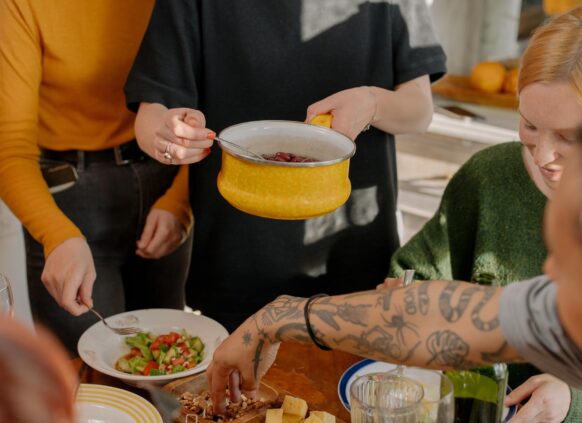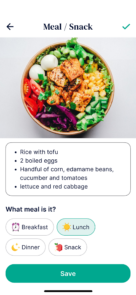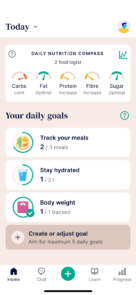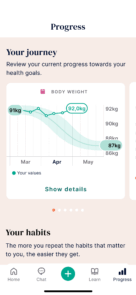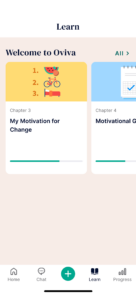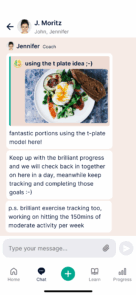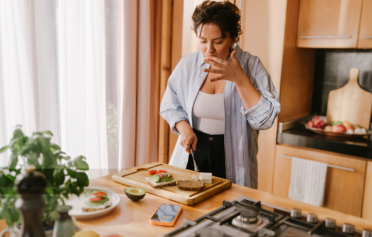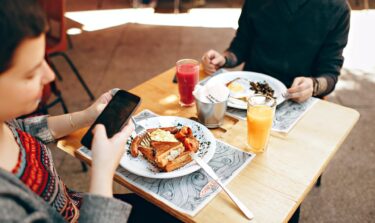
Calorie counter: how many calories to eat to lose weight
Sometimes, weight loss can be a minefield. Everywhere you look, people have different advice – so how do you know what to eat?
The truth is, everyone’s weight loss journey is different, but there’s one golden rule: weight loss is about eating less energy than you burn.
1 lb of fat contains about 3,500 calories. If you can achieve a daily calorie deficit of 500, you’ll lose around 1 lb a week, a sustainable weight loss rate that will help you hit your goals healthily.
However, it’s also important to focus on making positive lifestyle changes. Incorporating regular physical activity, ensuring you’re getting a balanced diet rich in whole foods, and staying hydrated can significantly enhance your weight loss efforts. Building healthy habits, rather than simply cutting calories, leads to more sustainable results and improves overall well-being.
Key Takeaways
- Eating 500 fewer calories per day can help you lose 1 lb each week.
- Regular exercise boosts calorie burn, helping to create a greater caloric deficit. For example, walking at 4 mph burns around 175 calories per hour.
- Focus on sustainable changes that you can maintain over time for long-term weight management.
Calorie counting and weight loss
In simple terms, calories are a way to measure energy. Technically, a single kilocalorie is the energy needed at the temperature to raise 1 kg of water by 1°C, but don’t worry, you don’t need a degree in science to understand them and know how to lose weight.
For most of us, all we need to know is that our body stores excess calories as fat. If we eat more than we burn, we gain fat. If we burn more than we eat, we lose weight.
You might sometimes see references to kilojoules – one calorie (kcal) equals around 4.2 kilojoules (kJ).
How much should I eat to lose weight?
The NHS recommends reducing your daily calorie intake by around 600 kcal to lose weight. That means dropping to about 1,900 kcal per day for men and 1,400 kcal for women.
That being said, every lifestyle and everybody is different. If you’re very tall or short, extremely active or sedentary, you might find that this basic formula doesn’t work for you. If you’re living with obesity, you’ll be able to achieve a greater deficit and see faster results.
Oviva’s personalised approach to weight loss includes tailored treatment plans and support from experienced healthcare professionals.
Calorie counter
Need to find out how many calories you should eat each day? Try our simple calorie counter tool, which calculates your daily calorie needs based on factors including your height, weight and activity levels.
Your calorie intake per day
to cal
This range of daily calories will help you reach your goal in a healthy and sustainable way.
Don’t want to count calories? Neither do we.
Our approach is to help people create balanced, nutritious eating habits and positive lifestyle change for health, well-being and achieving their optimal weight.
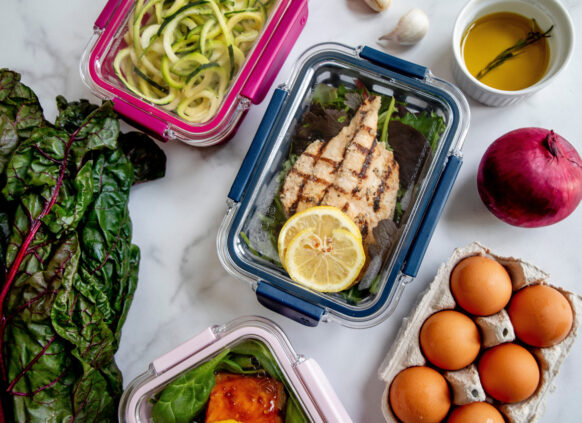
Recommended calorie intake per meal to lose weight
A woman eating 1,400 kcal a day can divide it like this:
- Breakfast: 280 kcal
- Lunch: 420 kcal
- Dinner: 420 kcal
- Snacks/drinks: 280 kcal total
For a man eating 1,900 kcal a day, a daily calorie split should look like this:
- Breakfast: 380 kcal
- Lunch: 570 kcal
- Dinner: 570 kcal
- Snacks/drinks: 380 kcal total
To reduce calories easily, opt for food that will keep you fuller for longer, like lean protein and fibre. And choose sugar-free drinks.
Choose healthy snacks too, and make sure you’ve always got options at home like fruit or hummus and veggie sticks.
Our healthy diet plan for weight loss gives you a 7-day meal plan, complete with recipes, designed by Oviva’s healthcare professionals and dieticians. Find some tasty recipes that will help you lose weight.
Where should my calories come from?
There are three macronutrients in our food: protein, carbohydrates and fat.
- Protein has 4 kcal per gram
- Carbohydrates have 4 kcal per gram
- Fat has 9 kcal per gram
That doesn’t mean fat is bad; we need it for a healthy diet. In fact, healthy fats play a crucial role in hormone health, especially for women. Adequate fat intake is important for the production of hormones, which can influence everything from metabolism to mood.
Experts recommend consuming around 50% of your daily calories from carbs and no more than 30% from fat in a standard diet. However, the best diet for weight loss all depends on what works best for you.
That’s why working with healthcare professionals and personal coaches through a programme like Oviva can be so helpful – you get tailored support on the nutrition that’s right for you.
How do I count calories?
Some people swear by calorie counting, but it’s not for everyone. Focusing on sustainable lifestyle changes that will help gradually lower your calorie intake is often easier. If you learn about portion size and healthy choices, there’ll be no need to get the calculator out at every meal or panic when ordering in a restaurant.
Packaged food always has a calorie count on the label, but you may not find the information so easily on whole foods. To work out calories in a nutritious, home-cooked meal, find out the calories for each ingredient, add them together and divide by the number of portions. Many recipes provide a calorie count, but you’ll need to follow the recipe exactly. For example, a single tablespoon of olive oil contains around 120 kcal, if you use more than the recipe recommends, that number will go up.
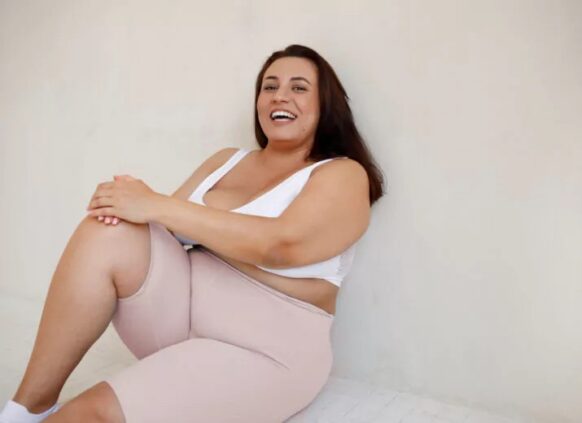
How can I reduce my calorie intake?
Here are some simple ways to reduce your daily calories. These tips will help you get started on your weight loss journey:
- Focus on food that will help you feel fuller for longer. That usually means protein, which you can add to your diet in the form of fish, meat, eggs, beans and lentils.
- Reduce your portion size. You can still eat all the tasty treats you love. Just go for half the size that you’d normally eat.
- Look for low-calorie ways to add flavour to your diet. Oily salad dressings, cheesy sauces, and mayonnaise add lots of calories to healthy meals. Instead, go for a squeeze of lemon juice and some flavour-packed herbs.
- Don’t forget drinks! Many of us guzzle down calories without realising it. Alcohol, sugary coffees and teas, fruit juices and fizzy drinks can all sabotage your best weight loss efforts.
- Consider medication. If you’re struggling to lower your intake, weight loss medication can help. It will reduce your appetite, making it easier than ever to cut down on calories.
Lose weight with our support
Would you like to choose the best weight loss app to help you on your journey? Try Oviva. We offer you a full, holistic approach to losing weight rather than just focusing on counting calories.
With the help of trusted NHS experts, we allow you to embrace a whole new lifestyle. You’ll take medicine to assist you on your journey, and we’ll give you the support and care you need. You’ll learn some simple ways to enjoy a sustainable, low-calorie lifestyle that lasts forever.
